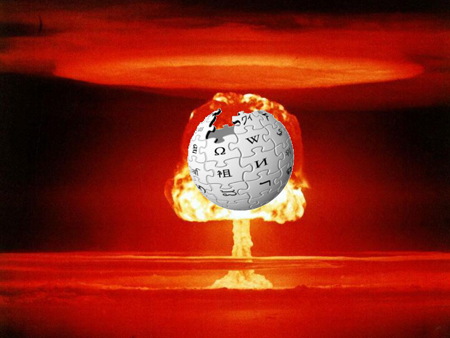If you were to ask any teacher, professor or academic what their pet hate was, the majority would probably say Wikipedia. Students, on the other hand, would probably not survive without it. Having learned about the nature of wikis this week, I can understand why."A mind-grenade as iconographic for this generation as a nuclear bomb was for the last." - Kevin Kelly
The etymology of the word wiki is the first sign as to what exactly a wiki is. Wiki is the Hawaiian word for “quick”. The idea behind the wiki is to enable the fast production of ‘pages’ and the fast distribution of facts and information. Wikis are characterised by the way they are accessed and edited. Articles are assessed by links from other articles, rather than in some form or sequential order (like an encyclopaedia), and can be edited by anyone within the wiki’s “world”. This means that a wiki open to the whole internet (such as Wikipedia) can be contributed to by any internet user, whereas a wiki that is specific to a particular intranet or group (such as a company or department) can only be contributed to by members of that group.
There are many situations in which a wiki is an appropriate source of information, and even more where it is patently not. Taking the example of academic institutions, let’s examine the value of Wikipedia. As a student, Wikipedia provides a useful first look into a topic that may be foreign. Once the basis of knowledge had been established, a student can move on to academic information and peer reviewed sources with the understanding required to actively and critically research. The trouble is that many students don’t. They simply use the information given on Wikipedia and reference this as their academic source. Teachers and academics have come to associate Wikipedia with lazy students, and some feel that Wikipedia is actively endangering the learning and research capabilities of the internet generation. My daughter informs me that some universities are actually giving automatic fails to students who use Wikipedia as an academic source.
Wikis do have high values outside of the academic realm. Company I.T departments can create wikis that aid computer users, for example. Within the library environment procedures and policies could be turned into a wiki allowing information to be accessed more efficiently as seen in Antioch University's Staff Training and Support Wiki. If the employee had to leave their post to get a manual, and then proceed to flick through it for the next ten minutes looking for the answer or procedure in question, valuable time is lost. A wiki such as this one would need to be locked so that only staff could contribute to it.
A wiki that allowed patron contributions would make a great community project. Book reviews and recommendations, upcoming shire events, news and community information could all be included, together with local business listings, information about shire history, industrial development projects and local school events.
As we can see, wikis have more value than they are first given credit for, but there is definitely an ethical element involved. Wikis must be used correctly, or the consequences may outweigh the benefits.

No comments:
Post a Comment